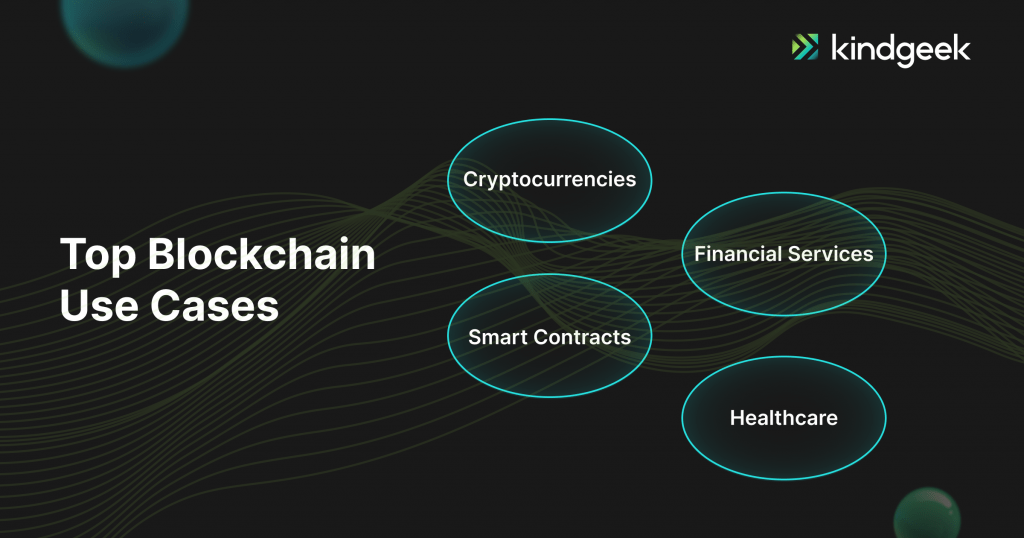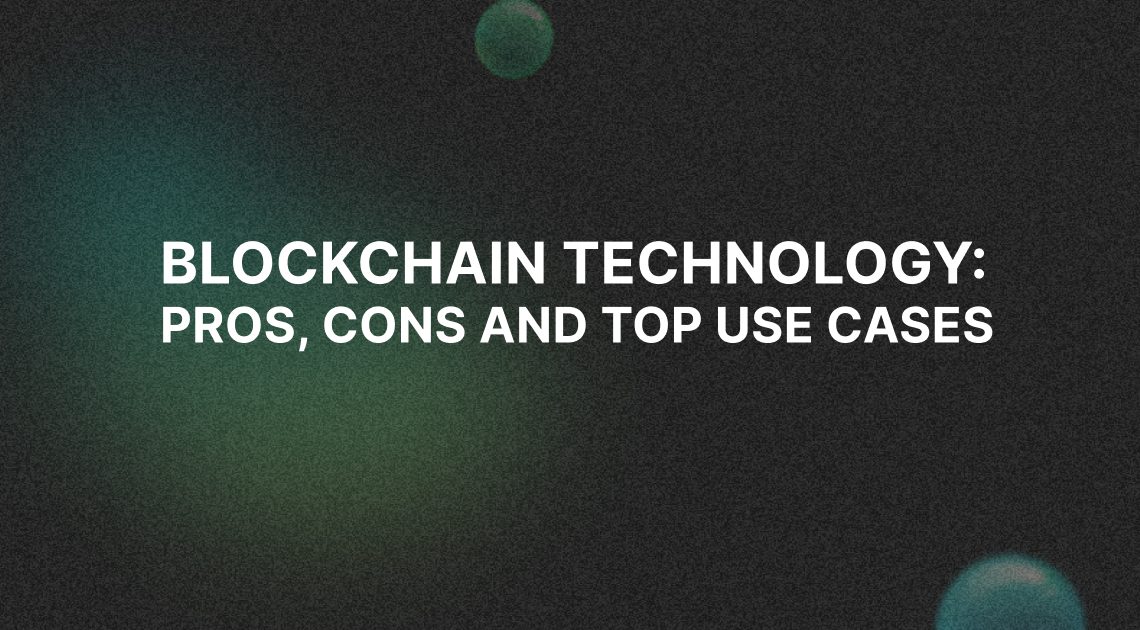Recently updated on April 18, 2025
Blockchain is a decentralised and distributed ledger technology that facilitates secure, transparent, and tamper-resistant record-keeping of transactions. It consists of a chain of blocks, where each block contains a list of transactions and is placed in chronological order. These blocks are linked through cryptographic hashes, forming a continuous and unchangeable chain.
Or, in simpler words – “Blockchain owes its name to the way it stores transaction data – in blocks linked together to form a chain” (Tiana Laurence “Blockchain For Dummies”).
Because these blocks are unchangeable, trust is primarily required when a user or program inputs data. This way, the need for trusted third parties is reduced significantly. This article dives deeper into different aspects, pros and cons of blockchain technology and explores some of the most interesting use cases.
| Pros of Blockchain technology | Cons of blockchain technology |
| Decentralization | Scalability issues |
| Security and Transparency | Energy consumption |
| Immutability | Lack of regulation |
| Efficiency and speed | Interoperability issues |
| Data integrity | |
| Innovation |
As you can see, there is a wide range of blockchain technology pros and cons, so let’s start with the benefits:
Pros of Blockchain Technology
There is a wide range of benefits of blockchain technology across different industries that would not be possible with traditional technologies for recording transactions. These advantages are possible because of the two main qualities: it’s open and secure. Let’s explore some of the advantages of blockchain technology:
Decentralisation
Blockchain operates on a distributed network of computers (nodes) rather than relying on a central authority. This decentralized structure offers several benefits. It reduces single points of failure, making the system more resilient. The decentralized nature increases resistance to censorship or control by any single entity. It also enhances data redundancy, as information is stored across multiple nodes.
Security and transparency
Blockchain relies on advanced cryptographic techniques to secure transactions. Using unique identifiers in each block creates a tamper-resistant environment, making it highly challenging for malicious actors to alter historical data. Transparency is inherent in blockchain, as all participants have real-time access to the same data. This shared information reduces the risk of discrepancies and builds trust among participants who can independently verify transactions.
Immutability
Once data is recorded on a blockchain, it becomes extremely difficult to alter. This feature ensures the integrity of historical records. It can provide a reliable audit trail for financial transactions, supply chains, or legal agreements. Immutability can be crucial in scenarios requiring tamper-evident record-keeping, such as in healthcare or government records. This characteristic helps prevent fraud and unauthorized changes to important data, maintaining the integrity of the information stored on the blockchain.
Efficiency and Speed
Blockchain facilitates direct transactions between participants, eliminating the need for intermediaries and streamlining processes. The automation of smart contracts further expedites transactions, reducing manual intervention. This automation minimises the risk of errors associated with manual contract execution. Industries like finance and supply chain management can see a significant reduction in paperwork and manual reconciliation. There’s also potential for near-instant settlement of transactions, compared to days for traditional banking systems, further enhancing operational efficiency.
Data Integrity
The cryptographic linking of blocks, distributed storage across multiple nodes, and consensus mechanisms for validation all contribute to maintaining data accuracy and consistency. The high level of data integrity offered by blockchain is valuable in various applications, from financial transactions and supply chain management to healthcare records and legal agreements. It significantly reduces the risk of data manipulation and errors, fostering trust in systems that utilize this technology.
Innovation
Blockchain enables the development of decentralised applications (DApps), opening avenues for innovative solutions across industries. The decentralised and trustless nature of blockchain fosters the creation of novel business models, driving innovation in various sectors.
Cons of Blockchain Technology
As with any other technology, blockchain, while offering significant advantages, also comes with certain disadvantages and challenges:
Scalability Issues
Scalability remains a significant challenge for certain blockchain networks, particularly as transaction volumes increase. This issue can manifest as slower processing times during periods of heightened activity, impacting the system’s overall efficiency. Various solutions like layer-2 scaling and sharding are being explored, but scalability remains a significant challenge.
Energy Consumption
The consensus mechanism, particularly the energy-intensive Proof of Work (PoW) used in some blockchains like Bitcoin, has been a source of concern due to its substantial computational requirements. This heightened energy consumption raises environmental considerations, especially as blockchain networks expand.
Lack of Regulation
The absence of comprehensive regulatory frameworks for blockchain introduces uncertainty, especially in industries where clear legal guidelines are essential for compliance and adoption. This regulatory uncertainty creates risks for businesses and users, potentially hindering adoption and innovation while leaving users vulnerable in a largely unregulated environment.
Interoperability Issues
Different blockchain platforms employing varied protocols encounter challenges in seamless interoperability. This lack of standardised communication protocols restricts the seamless exchange of data and assets across diverse blockchains. While solutions like cross-chain protocols are being developed, achieving seamless interoperability while maintaining security remains a significant technical challenge.
How to Overcome All the Disadvantages of Blockchain
Overcoming the challenges associated with blockchain technology requires a combination of technological advancements, regulatory developments, and industry collaboration:
Scalability Issues
- Layer 2 Solutions: Implementing layer 2 scaling solutions, such as state channels and sidechains, can alleviate congestion on the main blockchain.
- Consensus Mechanism Optimization: Exploring alternative consensus mechanisms, like Proof of Stake (PoS), that are more energy-efficient and capable of handling higher transaction throughput.
Energy Consumption
- Transition to PoS: Shifting from energy-intensive PoW to PoS or other consensus mechanisms that are more energy-efficient.
- Green Initiatives: Implement environmentally friendly practices and encourage using renewable energy sources for mining activities.
Lack of Regulation
- Advocacy and Collaboration: Engaging with regulatory bodies to advocate for clear and balanced regulations that foster innovation while addressing concerns about security and compliance.
- Industry Standards: Collaborating within the industry to establish and adhere to standards that can guide regulatory frameworks.
Interoperability Issues
- Standardisation Efforts: Participating in and promoting standardisation efforts within the blockchain industry to develop standard protocols that enhance interoperability.
- Cross-Chain Solutions: Implementing cross-chain solutions that facilitate the exchange of assets and data between different blockchain networks.
4 Top Blockchain Use Cases
Blockchain technology has found applications across various industries due to its decentralised, transparent, and secure nature. An interesting fact is that global spending on Blockchain solutions is set to skyrocket, reaching an estimated 3.2 trillion dollars by 2026. Here are some of the best use cases:

Cryptocurrencies
In the realm of digital currencies, Bitcoin stands as a pioneering force. Operating on a decentralised blockchain, Bitcoin is more than just a currency; it’s a store of value and a medium of exchange, free from the constraints of traditional financial intermediaries.
Ethereum, another significant player, introduced the concept of smart contracts. These self-executing contracts, governed by coded rules, have revolutionised the landscape. Ethereum’s blockchain not only facilitates automated processes through smart contracts but has become the cornerstone for decentralized finance (DeFi) applications. Users can now lend, borrow, and trade assets without the need for conventional financial institutions.
Smart Contracts
Talking about Smart contracts, picture a world where contracts execute themselves based on predefined conditions. Enter smart contracts, a game-changer in the realm of automation and trust. These code-based agreements ensure that tasks are completed precisely, minimising errors and enhancing efficiency.
Smart contracts extend beyond financial applications. In supply chain management, they automate and verify processes, ensuring transparency. In real estate transactions, these contracts streamline the entire process, from property transfers to escrow, ushering in a new era of efficiency.
Financial Services
Blockchain is reshaping the landscape of financial services. Traditionally fraught with delays and high fees, cross-border payments now benefit from the direct peer-to-peer nature of blockchain transactions. The removal of multiple intermediaries accelerates settlement times and reduces costs.
In the realm of remittances, blockchain enables swift and cost-effective global money transfers, especially benefiting individuals in regions with limited access to traditional banking services. The rise of decentralized finance (DeFi) platforms, built on blockchain, transforms lending, borrowing, and trading, decentralising financial services and empowering users.
Healthcare
Blockchain’s impact on healthcare is profound. Imagine a secure and interoperable system where health data is shared seamlessly among authorised entities. Blockchain provides just that. It ensures the integrity of health data, fostering interoperability and granting individuals greater control over their personal health information.
In the pharmaceutical industry, blockchain’s transparency and traceability revolutionise drug traceability. From production to delivery, every step in the pharmaceutical supply chain is recorded securely, reducing the risk of counterfeit drugs and ensuring the authenticity of medications.
Blockchain also plays a crucial role in clinical trials and research. Ensuring data integrity minimises the risk of manipulation or fraud in research studies. Moreover, the technology facilitates the secure sharing of research data among institutions, encouraging collaborative efforts.
Consider Kindgeek Your Trusted Fintech Software Development Partner
Kindgeek, a one-stop-shop fintech software development company, can help your business take advantage of the latest advancements in the industry. If you are looking for advanced crypto development services like a custom blockchain solution, smart contract development, or a decentralized finance (DeFi) platform, our team of experts has the skills and experience to deliver results. By choosing us, you can also leverage our expert partner network to enhance your product while streamlining the development process and speeding up time to market. Just contact us to start your journey.
Final Thoughts
Blockchain is a revolutionary technology that transforms how data is stored, verified, and transacted. Its uniqueness stems from its decentralised nature, immutability, transparency, security mechanisms, and the ability to facilitate programmable contracts. These features make it a versatile and disruptive force with applications across industries beyond just cryptocurrencies.
Blockchain use cases illustrate the versatility of this technology in transforming traditional processes, enhancing security, and fostering transparency across various sectors. The adoption of blockchain continues to grow as more industries recognise its potential for innovation and efficiency. It’s only important to be aware of all of the advantages and disadvantages of blockchain to make the best out of it.
What are the advantages of blockchain technology?
Recently updated on October 3, 2024
Blockchain provides a wide range of benefits across different industries, such as decentralisation, security and transparency, immutability, efficiency and speed, data integrity, innovation, and many more.
What are the disadvantages of blockchain?
Recently updated on October 3, 2024
While offering significant advantages, it also comes with certain blockchain technology disadvantages and challenges: scalability Issues, energy consumption, lack of regulations, interoperability Issues, and others.
How to overcome blockchain technology disadvantages?
Recently updated on October 3, 2024
Overcoming the drawbacks of blockchain is an ongoing process that involves collaboration among stakeholders, continuous research and development, and a commitment to adapting to emerging technological and regulatory landscapes.


